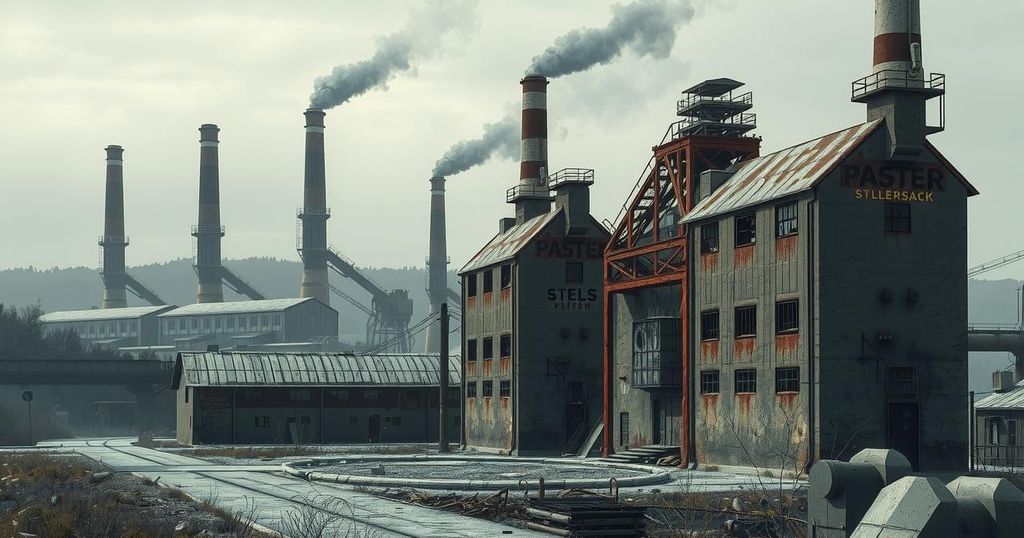Cars
ASEAN, ASIA, AUTOMOTIVE INDUSTRY, BAN, BANGKOK, BANGKOK IRON AND STEEL WORKS, CARBON BORDER ADJUSTMENT MECHANISM, CHINA, EUROPE, EXPORTS, FEDERATION OF THAI INDUSTRIES ’ STEEL INDUSTRY CLUB, FOREIGN INVESTMENT, INDUSTRY, KRUNGTHEP TURAKIJ, MEXICO, NORTH AMERICA, SUPPLY CHAIN, THAILAND, TRADE
Sofia Rodriguez
0 Comments
Crisis in Thai Steel Industry Due to Influx of Cheap Chinese Imports
The Thai steel industry is in crisis due to cheap Chinese imports, leading to 71 factory closures. Chinese manufacturers are increasing production, resulting in significant losses and layoffs. Industry leaders call for government action, urging support for eco-friendly manufacturing practices and proposing guidelines to enhance local production.
The Thai steel industry is currently facing a significant crisis due to an influx of inexpensive steel imports from China, which has resulted in the shutdown of 71 factories this year, according to Krungthep Turakij. This situation has intensified as local Chinese factories escalate their production in Thailand.
In 2024, China exported 110 million tonnes of steel, predominantly to Thailand and other ASEAN nations. This surge has contributed to mounting financial losses and substantial layoffs among leading Thai manufacturers, including Bangkok Iron and Steel Works.
Notably, Chinese manufacturers are utilizing induction furnaces in Thailand, a technology that China itself prohibited in 2017 due to environmental concerns. In contrast, Thai factories, which primarily employ electric arc furnaces for steel bar and wire rod production, face higher operational costs.
According to sources within the industry, the closures are exacerbated by a dramatic increase in Chinese prefabricated steel structures exported to Thailand, escalating from 400,000 tonnes in 2023 to 600,000 tonnes in the following year. As a result, there have been urgent calls for government intervention to ensure the long-term viability of the Thai steel sector.
Industry advocates are also highlighting the need for initiatives promoting low-carbon manufacturing to enhance competitiveness in European markets, particularly in light of the Carbon Border Adjustment Mechanism (CBAM), which imposes taxes on high carbon imports. This includes urging the government to support access to affordable renewable energy resources.
Bantoon Juicharern, chairman of the Federation of Thai Industries’ Steel Industry Club, has put forth seven key guidelines aimed at mitigating the effects of Chinese steel exports:
1. Prohibit establishment and expansion of certain steel factories exceeding local demand.
2. Promote government procurement of domestically produced steel from certified green factories.
3. Expedite the development of industrial standards for prefabricated steel structures.
4. Create measures to reserve iron scrap for domestic production.
5. Implement policies encouraging the reuse of materials from damaged vehicles.
6. Foster the use of domestic products in public-private partnerships and incentivized construction projects.
7. Enhance trade measures to align with changing market conditions.
In conclusion, the Thai steel industry is confronting a severe crisis attributed to the surge of low-cost Chinese steel imports, leading to numerous factory closures and significant workforce reductions. Strategic government intervention and the implementation of proactive guidelines are essential to restore competitiveness and sustainability within the sector. Promoting eco-friendly manufacturing practices will be crucial, particularly in light of international pressures related to carbon emissions.
Original Source: www.nationthailand.com




Post Comment